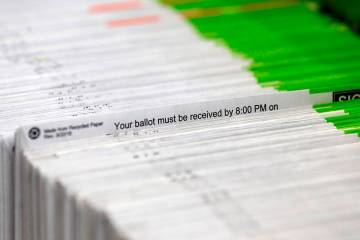EDITORIAL: Reforming teacher pay
Leading to the November general election, many political candidates will spend the next five months talking about their desire to increase teacher pay. Don’t expect them to point out how much teachers actually earn. If they did, there would be more of a push to reform how teachers are paid — which is what Nevada needs.
Increasing teacher pay is relatively popular with voters — and especially with the parents of schoolchildren. That could be, in part, because the public underestimates what teachers actually earn. A 2017 survey by Education Next found that taxpayers believed the average teacher made $40,587. Among the sample polled, the average was actually $58,258, not including benefits.
In Clark County, average teacher pay in 2015 was $56,120, according to a district report to the federal government. And that was before teachers scored $135.5 million in raises in their 2016 contract. Add in benefits, and the average district teacher earns around $80,000 in total compensation — and gets a two-and-half-month summer vacation.
The Education Next survey found that support for teacher pay hikes dropped from 61 percent to 34 percent when voters had access to the actual data.
But whether average teacher compensation should increase or decrease misses the larger point. The current system — a creation of the teacher unions — is a socialized pay scale that has virtually nothing to do with performance or student achievement. Teachers earn raises through longevity or taking pedagogical classes at education colleges regardless of whether they’re excelling, struggling or simply mailing it in. The system is an affront to excellent educators — and makes little sense for students, parents or taxpayers.
To that end, policy wonks Andrew Biggs and Jason Richwine have proposed much-needed reforms in a recent article for National Review. Among the suggestions: Target pay hikes to high-need areas such as math and science. Across-the-board raises are expensive and do little to direct applicants to areas of highest need.
Teachers could also see a salary hike by moving from a defined-benefit program such as PERS to a hybrid system, which would have elements of a 401(k). The savings could boost take-home pay today, which is what most teachers prefer.
Unfortunately, union leaders use scare tactics to fight needed pension reforms that would benefit many teachers. Right now, teachers who work fewer than five years in Nevada get nothing from PERS. They can’t even get back their own contributions.
By all means, let’s have a conversation about teacher pay. But that conversation will be incomplete without a discussion about reforming a system that ignores market realities and does nothing to reward excellence or improve student performance.




























